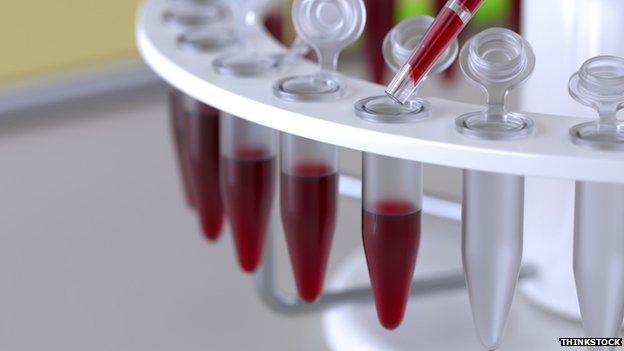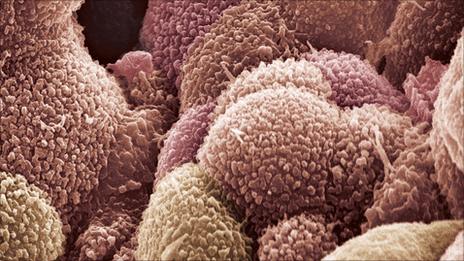Blood test 'boost' in ovarian cancer fight
- Published

Regular blood tests can detect 86% of ovarian cancers before the point at which women normally would be diagnosed, according to a trial that could lead to national screening.
Ovarian tumours are often deadly as they are caught too late.
The first results of the 14-year trial of more than 46,000 women suggest tumours can be detected early.
However, the University College London team caution that it is still unknown whether more lives were saved.
Around 7,100 women are diagnosed with ovarian cancer and 4,200 die of the disease each year in the UK.
The cancer is difficult to pick up as symptoms, including abdominal pain, persistent bloating and difficulty eating, are common in other conditions.
Blood clues
Ovarian tumours spew out high levels of a chemical called CA125, which is already used as a test if patients have symptoms.
The UK Collaborative Trial of Ovarian Cancer Screening performed annual blood tests on post-menopausal women across 13 NHS Trusts.
They tracked changes in the levels of CA125 over time and if levels became elevated then the women were sent for further tests including an ultrasound scan.
The trial results, published in the Journal of Clinical Oncology, showed 86% of cancers were picked up.
Prof Usha Menon, from University College London, told the BBC News website: "It's good, but the truth lies in whether we've picked up the cancer early enough to save lives, we hope we have.
"There is no screening at the moment so we are awaiting the results before the NHS can decide.
"Many people would have to be screened so it really needs to translate to lives saved."
The mortality data is expected in the autumn.

Analysis

By James Gallagher
A crucial decision on ovarian cancer screening is fast approaching.
Previous studies have questioned the benefit of screening programmes, but this trial - the largest in the world - is meant to produce the definitive verdict.
It started in 2001. The last blood tests were in 2011 and now the first results are coming through.
The early evidence seems promising.
Their method of monitoring CA125 over time determines what is a high level for an individual woman.
It seems to be twice as effective as previous attempts that just used the same cut-off value for all women.
This personalised approach may prove useful in screening for other cancers, such as prostate.
But the big question is, does ovarian screening save lives? We will know the answer in a few months.

Roughly one in four was in the earliest stages of cancer development - when there is just a single tumour or it has only just started to spread.
Prof Menon is optimistic that even the more developed tumours are being caught earlier than they normally would be - increasing the odds of successful treatment.
The project is the largest ovarian screening trial in the world and is also trialling regular ultrasound scans as a screening tool. The results of those tests are also expected later this year.
The UK National Screening Committee is closely following the research and will review an ovarian cancer screening programme, external when the full results are available.
Prof Patrick Maxwell, from the Medical Research Council, said: "These exciting initial results could eventually go on to form the basis of a national screening programme for ovarian cancer."
Dr James Brenton, an ovarian cancer specialist with Cancer Research UK, said: "A blood test to find women at risk of ovarian cancer is an exciting prospect, but this work still needs to be tested in women to see if it can save lives."
The Eve Appeal charity added: "These latest results are exciting and point towards the strides that we're making in more accurately predicting individual risk of developing cancer."
- Published5 June 2011

- Published16 October 2014

- Published26 August 2013
